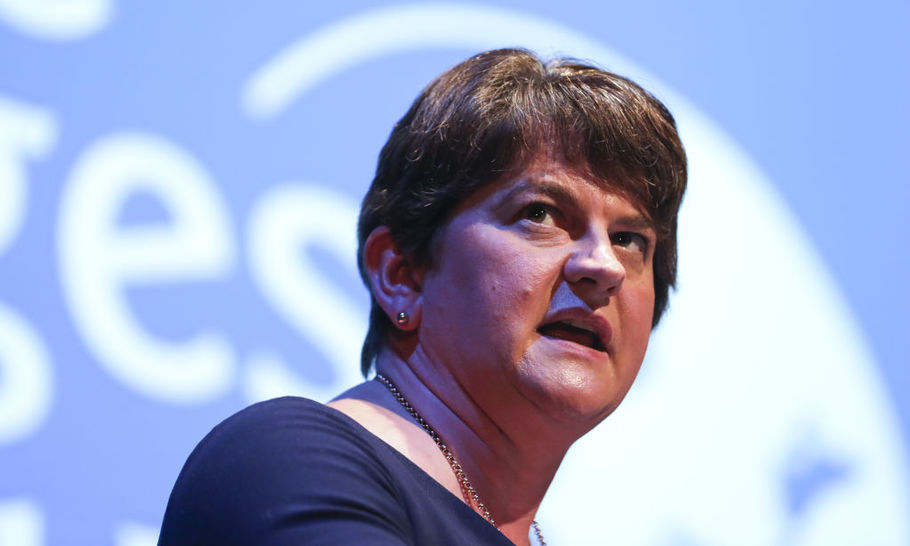The DUP has more important things to worry about that Boris Johnson's deal

Arlene Foster, at an event at the Conservative Party conference in Manchester, UK 2019. Photographer: Chris Ratcliffe/Bloomberg via Getty Images
The final negotiations over the Brexit deal concerned tampons. What would women in Northern Ireland think if after January 2021 they still had to pay VAT on them but women in Great Britain did not? It is still not clear quite how the conundrum will be resolved.
What we do know, though, is how the MPs from the Democratic Unionist Party feel about it. A statement said: “On VAT Northern Ireland will again be bound into arrangements that the rest of the United Kingdom will not. There is a real danger that over time Northern Ireland will start to diverge across VAT and Customs and without broad support from the democratic representatives of the people of Northern Ireland.”
There is also the objection that Northern Ireland will be “subjected to administrative burdens”. There would be a clunky arrangement where goods going from Great Britain to Northern Ireland would have any EU tariffs collected – but then reimbursed if they were sold in Northern Ireland rather than going across the border to the Irish Republic.
Of course, the point isn’t really about tampons or customs red tape. The unionist objection is one of principle. Different arrangements are being imposed on Northern Ireland.
True, there will be a chance for Northern Ireland to withdraw from these arrangements in the future. But it will be by a simple majority vote in the Northern Ireland Assembly. Under the Good Friday Agreement, there is a formula that requires decisions to be approved by “both communities.” The DUP argues a straight majority means the deal has “departed from the principle that these arrangements must be subject to the consent of both unionists and nationalists in Northern Ireland.” But the way forward from unionism is to stop entrenching and accommodating the sectarian divide. If the case can be made that bureaucratic interference is unnecessary and unjustified then let a majority be persuaded.
If a free trade deal with the EU is agreed for 2021 onwards, there might be some compromises by the UK. For instance, we might agree to state aid rules that prevented the “unfair competition” of the British Government subsidising a particular product. But it would seem likely that there would also be some continuing special arrangements for Northern Ireland. Put it this way: if Great Britain ends up with a 95 per cent or 100 per cent Brexit, the deal for Northern Ireland might be that they have 85 per cent or 90 per cent.
It is not as though the Democratic Unionists wish Northern Ireland to be governed in the same way as the rest of the UK in other respects. As with Scotland and Wales there are arrangements for devolved Government. The DUP have argued for greater differences with the UK in certain respects. They have proposed a lower rate of Corporation Tax in Northern Ireland to make the economy more competitive. Corporation Tax is 19 per cent in the UK, but 12.5 per cent in the Irish Republic.
Talk of a Northern Ireland Assembly veto feels a bit otiose at present – for the obvious reason that the Assembly is so dysfunctional. It hasn’t sat since January 2017 since power-sharing arrangements between the DUP and Sinn Fein broke down. Perhaps as the Assembly is not sitting the salaries of its members should cease to be paid – that might concentrate minds. Direct rule from Westminster should be reinstated, rather than allowing decision making to drift.
One respect where Northern Ireland should be treated more like the rest of the UK is in local government. The Ulster Unionist Party has a list of “powers we want to see wrestled from the grip of Stormont Departments” It includes community regeneration, street lighting, roadside grass cutting, libraries, youth services, minor roads maintenance, on-street car parking and responsibility for the natural and built heritage. Pretty reasonable for local democratic accountability to apply for these sort of services. The Alliance Party has called for the sort of spending transparency requirements councils have in England as a safeguard against corruption and sectarian favouritism.
The Brexit deal that Boris Johnson has negotiated should be regarded as a boost for the unionist cause. The scaremongering about leaving on “no deal” terms was pretty irresponsible. Nobody was ever going to set up customs posts on the border. But tariffs between Northern Ireland and the Irish Republic would have been damaging to both sides. Northern Ireland, along with the rest of the UK, can look forward to free trade continuing with the EU and being able to take advantage of new trade deals with the rest of the world.
So the DUP should accept the deal despite the constitutional impurity it entails. The greater priority is for robust domestic arrangements for Northern Ireland to thrive both politically and economically. That is the most important way to entrench it within the United Kingdom





